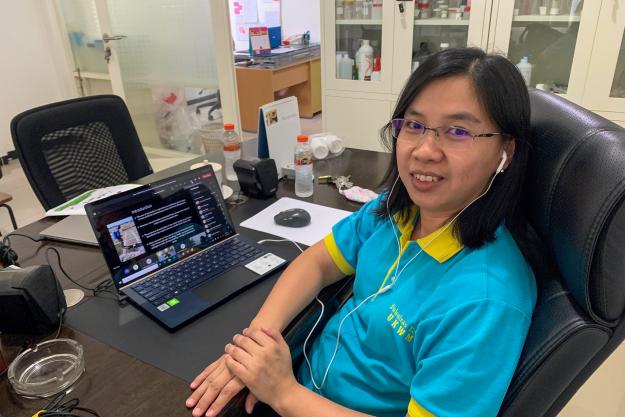THE HAGUE, Netherlands—26 November 2020—Scientists and chemistry professionals presented the findings of research projects funded by the Organisation for the Prohibition of Chemical Weapons (OPCW) and the International Foundation for Science (IFS), Sweden, during a workshop held online from 25 to 26 November. Grant recipients from 13 OPCW Member States participated in the event, part of the OPCW’s Research Projects Support Programme.
The workshop focused on projects from the past 10 years in the area of environmental pollution from toxic chemicals. Participants learned about research support opportunities available through the OPCW and the IFS and discussed how the organisations can more effectively assist the scientific community in countries with developing and transitioning economies.
OPCW’s Director of the International Cooperation and Assistance Division, Ms Kayoko Gotoh, noted in her opening remarks: “Supporting scientific research and engaging with the research community are fundamental for the success of our mission and instrumental to the future of the OPCW and the Convention.”

A participant of a joint OPCW-IFC workshop
IFS Director, Ms Nighisty Ghezae, stressed: “The Foundation is committed to solving some of the hardest global challenges and equipping early career researchers for a future that may be fundamentally different from ours.” She also underlined that the IFS awarded a significant portion of its grants to female scientists.
Women grant recipients underlined the importance of OPCW and IFS support for their professional growth. More than half of those speaking in the workshop were women.
The event also served as an opportunity to launch a new OPCW publication titled “Toxic Chemicals in the Environment: from Understanding Pollution and its Impact to Removal and Verification Techniques”. The publication presented the research of scientists who had received OPCW and OPCW-IFS grants.
The workshop was attended by 15 grant recipients from universities and research institutes, as well as representatives of the OPCW Scientific Advisory Board (SAB) and IFS’s Board of Trustees and Scientific Advisory Committees. The grant recipients came from the following 13 OPCW Member States: Argentina, Benin, Burkina Faso, Cameroon, China, India, Indonesia, Malaysia, Nigeria, Pakistan, South Africa, Sri Lanka, and Uganda.
Background
The workshop was part of OPCW’s Research Project Support Programme. Established in 1998, the Programme promotes the peaceful applications of chemistry under Article XI of the Chemical Weapons Convention by supporting small-scale research projects in OPCW Member States with economies that are developing or in transition.
At the Programme’s inception, the OPCW entered into partnership with the International Foundation for Science (IFS) to jointly support research projects. Since 2015, this cooperation has been governed by a Memorandum of Understanding that provides for periodic workshops to review and highlight progress.
More than 500 research projects have received support through the OPCW-IFS funding.
As the implementing body for the Chemical Weapons Convention, the OPCW, with its 193 Member States, oversees the global endeavour to permanently eliminate chemical weapons. Since the Convention’s entry into force in 1997, it is the most successful disarmament treaty eliminating an entire class of weapons of mass destruction.
Over 98% of all declared chemical weapon stockpiles have been destroyed under OPCW verification. For its extensive efforts in eliminating chemical weapons, the OPCW received the 2013 Nobel Peace Prize.
